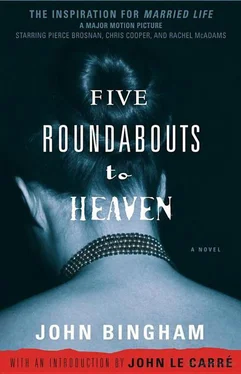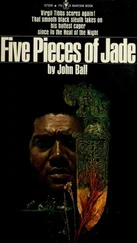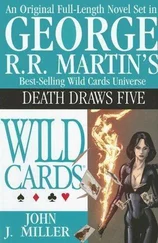John Bingham - Five Roundabouts to Heaven
Здесь есть возможность читать онлайн «John Bingham - Five Roundabouts to Heaven» весь текст электронной книги совершенно бесплатно (целиком полную версию без сокращений). В некоторых случаях можно слушать аудио, скачать через торрент в формате fb2 и присутствует краткое содержание. Жанр: Криминальный детектив, на английском языке. Описание произведения, (предисловие) а так же отзывы посетителей доступны на портале библиотеки ЛибКат.
- Название:Five Roundabouts to Heaven
- Автор:
- Жанр:
- Год:неизвестен
- ISBN:нет данных
- Рейтинг книги:4 / 5. Голосов: 1
-
Избранное:Добавить в избранное
- Отзывы:
-
Ваша оценка:
- 80
- 1
- 2
- 3
- 4
- 5
Five Roundabouts to Heaven: краткое содержание, описание и аннотация
Предлагаем к чтению аннотацию, описание, краткое содержание или предисловие (зависит от того, что написал сам автор книги «Five Roundabouts to Heaven»). Если вы не нашли необходимую информацию о книге — напишите в комментариях, мы постараемся отыскать её.
Five Roundabouts to Heaven — читать онлайн бесплатно полную книгу (весь текст) целиком
Ниже представлен текст книги, разбитый по страницам. Система сохранения места последней прочитанной страницы, позволяет с удобством читать онлайн бесплатно книгу «Five Roundabouts to Heaven», без необходимости каждый раз заново искать на чём Вы остановились. Поставьте закладку, и сможете в любой момент перейти на страницу, на которой закончили чтение.
Интервал:
Закладка:
He sat down on the arm of an easy chair and covered his face with his hands. Lorna came to his side and put her arm once more round his shoulders.
“What is it, Barty?”
He put his hands down, and got up and moved to the mantelpiece, and stood there irresolutely, still trying to think of other references, still trying to decide what to do.
There was at least one other reference, but he couldn’t exactly recall it, except to remember that he had thanked her for reassuring him that he would be justified in doing what he contemplated.
All were references to the talk which at one time he thought he would have with Beatrice; each and every one, taken in conjunction with other factors, was enough to sway the minds of a jury; enough to implicate Lorna as well as himself.
They hanged Mrs Thompson. What of Lorna? What chance does “the other woman” have in cases like this?
Counsel in court. Bewigged, hard, implacable Counsel. Hitching up his gown, smiling, self-confident.
“You have, then, members of the jury, ample evidence that the death of Mrs Bartels was calculated to further the sordid plans of both the accused.
“You have evidence that Mrs Bartels died from the effects of a poison which it is extremely difficult to detect, the symptoms of which, but for the praiseworthy vigilance of the local practitioner, might easily have been confused with those indicating coronary thrombosis.
“You have the evidence of the Manchester chemist that a man, whom he has identified as the prisoner Bartels, bought altrapeine in his shop, that he had removed his glasses to make himself less readily identified, and that he signed the poisons book using the name and address of a perfectly respectable Leeds businessman who bore no resemblance to the prisoner, and has never bought altrapeine in his life.
“And you have those highly significant remarks in his letters to the woman Lorna Dickson: ‘We shall be alone this weekend. A good opportunity to do it.’ And again: ‘from you I will draw the strength to enable me to do that which we both know has to be done sometime.’ Note the words, please: that which we both know has to be done. Ample evidence, I submit, that the woman Dickson knew that this horrible crime was going to take place.”
The witness Miss Latimer. The hotel bartender. Agitated and distressed.
And on and on and on.
Nobody would put anything but the most sordid constructions on his love for Lorna. Nobody would believe that it was love and not sensual lust which had prompted the crime.
Bartels swung round from the fire. It was 9.20 now. He said abruptly:
“Lorna, my dear, may I have back the letters I wrote to you-now?”
Lorna said: “Of course you can have them back. But you don’t want them tonight, surely?”
“Wouldn’t it be better?”
“What do you want to do with them? Burn them, I suppose?”
“It is better for both of us to have them out of the way.”
Lorna smiled faintly. “You are being very practical, Barty.” She thought for a moment and added: “Won’t you trust me to burn them for you? Or post them to you at your office, if you wish?”
“It’s the sort of thing one can forget,” said Bartels, trying to keep his voice steady. “It might be better if you gave them to me now, Lorna. If you don’t mind, that is.”
“My dear, they are all over the place. Some in the bureau, some in the drawer of my dressing table, all over the place.”
Bartels thought: Ten minutes to collect them, or fifteen minutes, or perhaps more. And then no guarantee that he had them all, that he had the important ones. What was the good of it? Better to go now, and drive fast. Already ten minutes had gone by.
“You don’t think I’m going to blackmail you with them, do you, Barty?” Lorna spoke jestingly, trying to lift the tension which had settled in the room.
But he answered her seriously. “No.” He shook his head. “No, I know you wouldn’t do that. No, it’s not that at all.”
He couldn’t press the matter any further. Apart from the time factor, it would look peculiar. He felt that already he had gone further than he should have done.
He looked at her helplessly, his brown eyes worried behind the old-fashioned spectacles, his hair standing up slightly on the crown of his head. His face, with the wide mouth and thin straight nose, normally sallow, was flushed by the whisky he had drunk, and the heat of the room, and his state of excitement.
“Never mind,” he said slowly. “Don’t let’s bother about them tonight.”
“I’ll post them to you tomorrow, Barty-to your office, by registered post, marked private and personal, shall I?” She tried to seem brisk and normal.
“No,” said Bartels quickly. “Don’t bother to do that. Burn them, Lorna, tomorrow morning. The whole lot, without fail.”
Lorna nodded. “As you wish.”
Bartels looked once round the room, and then at Lorna Dickson. She stood under the chandelier, and returned his gaze. For fully a minute they stared at each other, sad-eyed, uncomfortable, not knowing exactly what to say now that the moment had come to part.
Bartels felt little bitterness now. Numbly, through the pain and the eddies of fear in the back of his mind, he realized that this was the end of his search. Whatever happened, there would be no love in his life of the kind of which he had dreamed as a boy, because there never would be and never could be another Lorna.
Watching Lorna, he began to doubt for the first time whether in fact she was, or ever had been, truly in love with him. Else why had she shown comparatively little emotion this evening?
Surely, if one were in love, as he was, you forged ahead irrespective of other people’s feelings, ruthlessly, driven on by a fire which nothing could withstand. You cared nothing for anybody, you were prepared to strike, and even to destroy as he had planned to destroy.
That was it, that was the test: you were prepared to destroy. Lorna wouldn’t go even halfway with him on that score.
Illogically, he felt irritated at her calm. Childishly, he thought that she might at least pretend to feel more emotion. Petulantly, he thought that greater signs of distress were even his just due.
But he said nothing.
He turned round suddenly, and opened the drawing-room door and went into the hall and put on his coat and hat and gloves, and walked slowly to the front door.
Lorna followed him to the front door, and the corgi dog, thinking that a walk might be in the offing, was at her heels.
He opened the door and the dog went out. Bartels paused.
“Well, what are you going to do now?” he asked inconsequentially. “Going to bed?”
She nodded. “I’m tired.”
He pulled out his cigarette case, and offered her one, and when she refused, lit one himself.
“I’ll wait till you’re upstairs-as usual.”
It was an old custom. When she was upstairs she would open her window and wave to him.
Only now did she show any real emotion. She tried to smile. Her lips trembled. Bartels looked quickly away, and walked through the doorway.
“Well, I’m off,” he said. Outside, he turned round and said: “Well, goodbye, Lorna.” He hesitated a second; he wanted to add: “Goodbye, darling.” But he didn’t.
She stood in the doorway while the corgi walked past her into the warmth of the house. She raised her hand and waved; it was a confused, feeble little movement. She said nothing.
That was the last picture he had of her, standing in the doorway while the corgi dog walked past her. Then she closed the door.
He walked to the little garden gate and waited as usual. The light went out in the porch. The light went out in the drawing room, and in the hall, and he thought: She is going up the stairs now.
Читать дальшеИнтервал:
Закладка:
Похожие книги на «Five Roundabouts to Heaven»
Представляем Вашему вниманию похожие книги на «Five Roundabouts to Heaven» списком для выбора. Мы отобрали схожую по названию и смыслу литературу в надежде предоставить читателям больше вариантов отыскать новые, интересные, ещё непрочитанные произведения.
Обсуждение, отзывы о книге «Five Roundabouts to Heaven» и просто собственные мнения читателей. Оставьте ваши комментарии, напишите, что Вы думаете о произведении, его смысле или главных героях. Укажите что конкретно понравилось, а что нет, и почему Вы так считаете.












